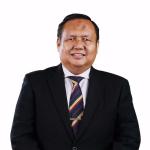
The UNESCO-UNEVOC International Centre: Who We Are | What We Do | Working With Us | Get in Touch
The UNEVOC Network: Learn About the Network | UNEVOC Network Directory
For Members: UNEVOC Centre Dashboard
Thematic Areas: Inclusion and Youth | Digital Transformation | Private Sector Engagement | SDGs and Greening TVET
Our Key Programmes & Projects: BILT: Bridging Innovation and Learning in TVET | Building TVET resilience | TVET Leadership Programme | WYSD: World Youth Skills Day
Past Activities: COVID-19 response | i-hubs project | TVET Global Forums | Virtual Conferences | YEM Knowledge Portal
Our Services & Resources: Publications | TVET Forum | TVET Country Profiles | TVETipedia Glossary | Innovative and Promising Practices | Toolkits for TVET Providers | Entrepreneurial Learning Guide
Events: Major TVET Events | UNEVOC Network News
Universiti of Tun Hussein Onn Malaysia (UTHM), formally known as Kolej Universiti Teknologi Tun Hussein (KUiTTHO), is a Malaysian higher learning institute, which traces its origins back to 1993 when it was the Polytechnic Staff Training Center. Due to its significant role and contribution in producing qualified polytechnic lecturers and also due to the government’s high level of trust towards the capability of the organization, the training centre was officially awarded the status as a public university in 2000. Thus, the role of the university is not only to fulfill the demands for academic lecturers and teaching instructors of the institutions such as polytechnics, community colleges, and technical schools, under the technical education department of the Ministry of Education in Malaysia, but also to the other public and private technical institutions and training centers. Apart from that, the primary aim of UTHM is to produce graduates, which will fulfill the demand for highly qualified professionals and technocrats in the field of engineering and technology. The university conducts post-graduate, bachelor and diploma level courses in civil, mechanical, electrical engineering and Technical and Vocational Education with specializations in 34 different areas.
Faculty of Technical and Vocational Education (FPTV) is one of the eight faculties in the UTHM and is primarily focusing on TVET teacher training (TT) and education. FPTV is the professional faculty with niche in TT-TVET. The faculty offers a range of quality academically balanced and practical-oriented programmes to meet the changing needs of the teaching and training sectors of the economy. FPTV programmes of study are dynamics that lead the rapidly transformation of TVET both regional and worldwide. FPTV qualified and experienced academia’s and supporting staff are dedicated to provide high standard and state-of-the-art theoretical and practical knowledge in a stimulating and innovative learning atmosphere.
UTHM envisions to be a global technical university in a sustainable technology and transportation. Its mission is to provide technical solution for industry and community based on tauhidic paradigm.

